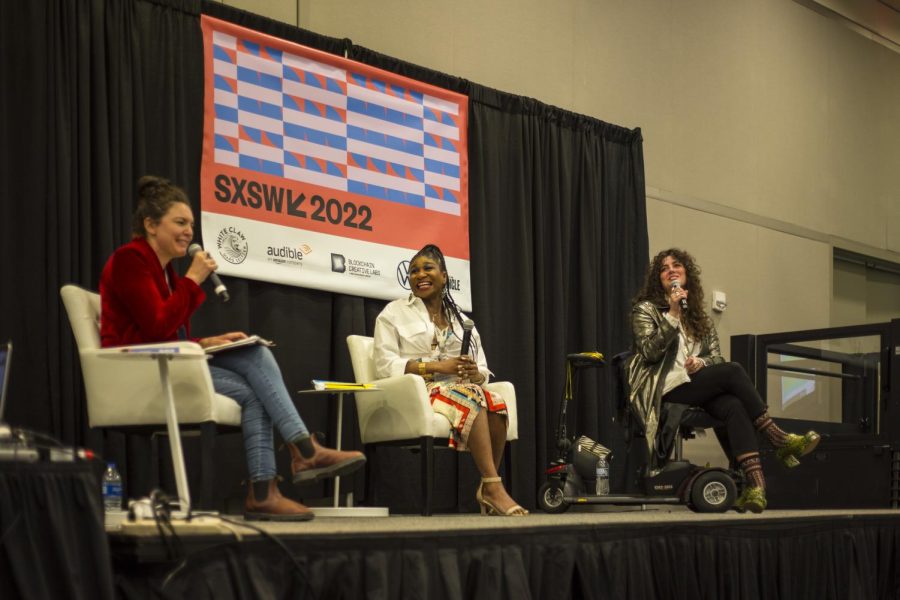Artists Eliza Hull, Lachi, Ruth Lyon discuss challenges, change in panel ‘Disability: Is the Future of Music Accessible?’
March 21, 2022
Standing in front of a midsized crowd, Eliza Hull cleared her throat briefly, letting the sound echo, as her eyes scanned the room at this year’s South by Southwest — her mouth pulled into a smile. Hull said a quick hello, expressed her gratitude to the crowd and dove right in.
“Is the future of the music industry accessible?” Hull said. “That is the big question that we’re going to ask today. My name is Eliza Hull. I’m a proud disabled woman. It’s a real thrill to be here.”
Together with musicians Lachi, Ruth Lyon and Dina Basille — hailing from the U.S., the U.K. and Australia respectively — Hull hosted a panel Friday featuring the voices of disabled artists and event coordinators to explore the industry’s potential to be truly accessible.
At the start of the discussion, the Australian singer-songwriter reflected on the earlier years of her career. Stigma and lack of representation, Hull said, left her feeling alone and afraid of being left out due to her disability.
“I hid my disability for a very long time, … especially in the music industry,” Hull said. “Whenever I went to go and meet a manager or potential record label, I would make sure that somebody else let me into the building so that I could pull myself up the stairs without anyone noticing, or sit down and hope that they wouldn’t notice that I walk differently.”
After each panelist introduced themselves, Hull requested musician Lachi — founder of the advocacy platform for others in the industry, Recording Artists and Music Professionals with Disabilities, to start the conversation and share the obstacles she faces in her career.
“(One) of the biggest barriers as a woman who is legally blind (and) has been sighted-passing for a long time is social discrimination,” Lachi said. “I have to hide my disability and a part of myself. … Knowing that if I possibly out myself, I would be treated differently. I may lose an opportunity. … It makes me internalize that ableism as well, so I have to fight against myself first, then fight against society.”
Chiming in after Lachi, BBC-recognized singer Ruth Lyon shared her perspective on having a visible disability and how it shapes her day-to-day life as a performer.
“I am a wheelchair user, so as soon as I turn up to a venue, everybody can see it,” Lyon said. “A lot of people underestimate me and patronize me. When I’m with my band, they think I’m somebody’s girlfriend. They don’t think I’m the lead singer. It’s cool that I can prove them wrong, but it’s annoying that people don’t see me as a fierce woman that is taking over the music industry.”
As the panel pivoted to discuss the changes necessary to see a shift in society’s attitude surrounding disabled people and accessibility in music, Lachi said language is one of the most important aspects, and the group readily agreed.
“When we speak specifically about the word disability, say the word,” Lachi said. “(Other) types of words are just euphemisms because people are shying away from saying the actual word — but euphemisms exist because you want to cover up something bad, and there’s nothing wrong with disability that needs to be covered up.”
Attempting to answer the guiding question of their talk, Lyon said while she can’t imagine what is to come, the key is not shying away from having conversations about disability and giving disabled people a seat at the table.
“My disability has taught me about my life, and it feeds into my heart. It makes me a more compassionate person. It makes me a more determined person, and I feel very powerful,” Lyon said. “I think that if we don’t have that representation, then the nondisabled community are (also) losing because I feel like we’ve got something really special to share.”



